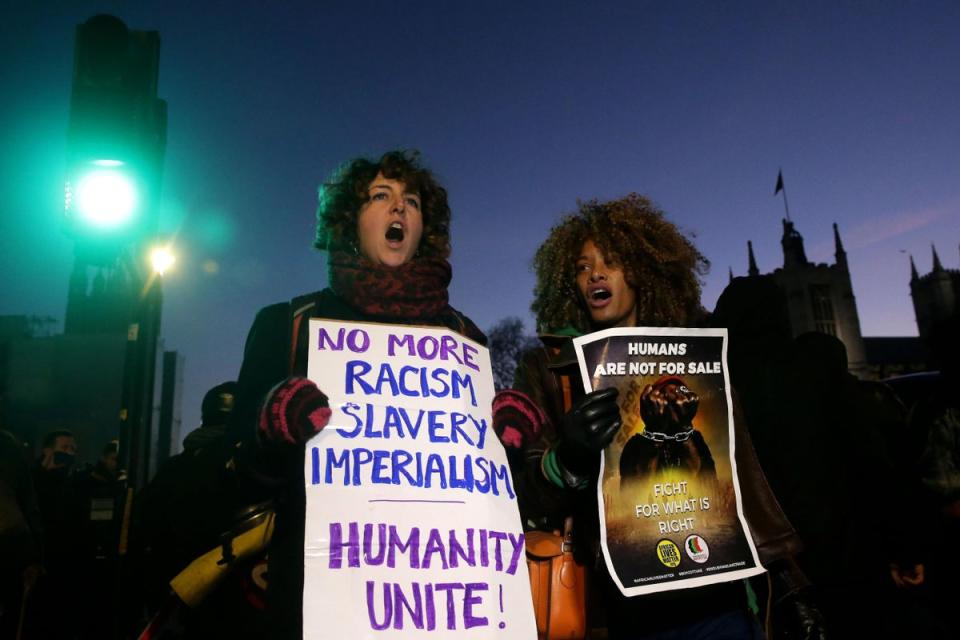What is modern slavery and why is it rising? Reports double in UK care sector

The number of reports of modern slavery cases in the UK over the past year has reached its highest ever level, with cases in the care industry more than doubling.
The total number of potential victims referred to the Home Office across all sectors in 2022 was almost 17,000 — the highest number ever recorded, according to BBC File on 4.
There are currently more than 300 active care sector investigations, according to the Gangmasters and Labour Abuse Authority (GLAA), who protect against labour exploitation in the UK.
Investigators said that the care sector has gone from “not being on their radar” to being their “top priority” in the past 18 months.
The National Police Chief’s Council told the BBC it had a special team leading work to “understand and tackle” the problem.
However, prosecution rates for cases are extremely low. Last year, police in England and Wales recorded nearly 10,000 cases. Half of these were closed because offenders couldn’t be traced, and less than two per cent resulted in charges.
“Victims of modern slavery are extremely vulnerable,” Sara Thornton, the former Independent Anti-Slavery Commissioner, told the BBC.
“They will be in terror of the people who’ve trafficked or enslaved them, who will tell them there’s no point going to the police or the local authority or a charity because they won’t support you.”
What is modern-day slavery?

The definition of slavery is no longer just based on the concept of being owned by someone. Modern definitions include being forced to work under threat and being controlled by your employer.
Kathy Betteridge, director of the Salvation Army’s anti-trafficking and modern slavery unit, said: “Modern slavery shows itself in a number of different forms, including forced labour and sexual exploitation, where women are taken and deceived, and abused.”
In the UK, most commonly, people are trafficked into forced labour in industries such as agriculture, construction, hospitality, and car washes.
Who are the victims of modern slavery?
Victims are often vulnerable and easy for others to take advantage of.
This can be someone living in poverty with no job prospects, who will accept a job abroad that turns out to be something other than what was promised.
Children are also vulnerable. In 2017, more than 2,000 children were referred to British authorities as potential victims of slavery.
Why has modern slavery risen so much in the UK in the past year?
Anti-slavery charity Unseen told the BBC that a rise in calls about the care sector over the past year to their helpline is because the Government has made it easier for social care staff from abroad to work in the UK to fill thousands of job vacancies post-Brexit.
The bigger the supply chain, the more opportunity there is for exploitation, the charity said.
In the year to March, the Government had issued 102,000 skilled worker, health, and care visas to foreign workers, an increase of 171 per cent compared to the previous year. In a statement to File on 4, it said that more than £17.8m had been spent policing modern slavery since 2016.
Speaking to the Standard in 2018, Ms Betteridge said year-on-year rises could be a combination of both increased awareness and increased cases.
“We believe this could be a combination of an increase in modern slavery as well as raised levels of awareness and understanding, which means law enforcement agencies are more active and the Salvation Army is receiving more referrals,” she said.
How do people become vulnerable to human trafficking and slavery?
“People can be vulnerable to becoming victims of modern slavery for many different reasons,” says Ms Betteridge.
“Situations such as debt, substance addiction, relationship breakdowns, homelessness, or extreme poverty can mean a person is looking for a way into a different life and are therefore vulnerable to false promises.
“Traffickers often lie to victims to tell them there is no-one to help them. That’s why it’s important for everyone to know we are here; we can transport them out of the situation, give them safe accommodation, and support them with any of their needs — from physical and mental health to financial and legal help.”
Could our country better prevent human trafficking?
In 2009, the Government set up the National Referral Mechanism (NRM) to refer individual cases and through which victims can access support.
However, some critics argue that cases weren't dealt with properly.
Anti-Slavery International said: “Victims were not supported and traffickers were getting away with their crimes.”
After the Modern Slavery Act 2015 was launched in response to failings in the NRM system, significant steps forward were made.
Under the new act, businesses had to report on how they tackle slavery in their global supply chains and an anti-slavery commissioner was established to oversee the UK's policies to tackle slavery.
However, Anti-Slavery International says the act was too focused on policing.
It said: “Many are not recognised as victims and not supported properly. Many are treated as immigration offenders rather than victims of a serious crime.
“They are also less likely to act as witnesses in court and help prosecute the traffickers.”
According to UK Independent Anti-Slavery Commissioner Kevin Hyland, only one per cent of victims of slavery have the chance to see their exploiter brought to justice.
What can I do to help victims of modern slavery?
Call 999 immediately if you believe someone is being trafficked.
You can also dial the Modern Slavery Helpline on 08000 121 700 or Crimestoppers on 0800 555 111.
The Salvation Army also runs a 24-hour confidential Referral Helpline on 0300 3038151.
The Standard has an action platform designed to help Londoners spot the signs and help victims in danger.

 Yahoo News
Yahoo News 